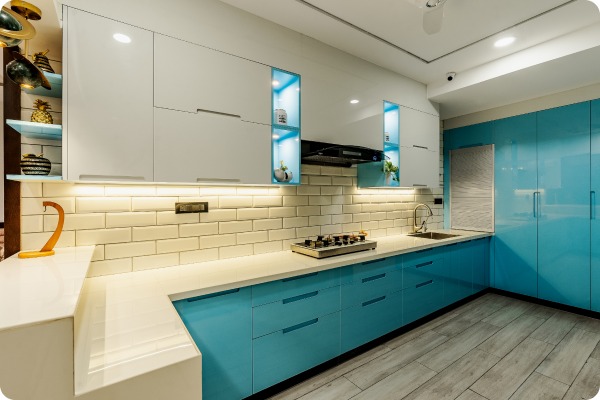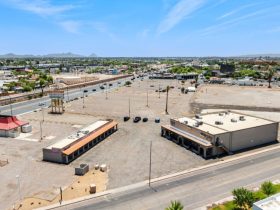As the world grows more connected and people seek adventures far from urban sprawl, the demand for self-sufficient living has skyrocketed. For off-grid enthusiasts, modular kitchens are a game-changer, providing the freedom to cook, live, and thrive in remote locations. These flexible, mobile solutions enable adventurers to create home-cooked meals without compromising on functionality, style, or space. Whether it’s for van life, tiny homes, or camping, modular kitchens cater to the growing community of adventurers who value both practicality and comfort.
The Essence of Off-Grid Modular Kitchens
Key Features of a Modular Kitchen for Off-Grid Living
A modular kitchen designed for off-grid living brings compactness and efficiency into the forefront. These systems are built to adapt to your space and lifestyle, offering various benefits that traditional kitchens cannot.
- Compact and Portable Design
- A modular kitchen’s design is ideal for spaces where every inch counts. For adventurers living in vans or mobile homes, a portable setup allows easy transportation without compromising essential functions.
- From collapsible work surfaces to multifunctional storage, these kitchens make the most of small spaces, ensuring convenience even in the most remote locations.
- Lightweight Materials
- Lightweight construction is key to maintaining mobility and minimizing strain on vehicles or trailers. Materials such as aluminum, composite plastics, and other sturdy yet light materials are commonly used in modular kitchens.
- These materials not only ensure easy handling but also guarantee durability under harsh outdoor conditions.
- Self-Sufficient Systems
- Off-grid kitchens integrate self-sufficient features like solar panels for power, compact water filtration systems, and even battery-operated appliances. These additions eliminate the need for constant dependency on external power sources, ensuring continuous operation in isolated environments.
- This autonomy is essential for maintaining an off-grid lifestyle that is truly independent.
Types of Modular Kitchens for Adventurers
Van-Life Kitchens
Van-life kitchens cater specifically to those who live on the road, offering kitchen setups that fit seamlessly into camper vans and RVs.
- Integration with Vehicle Power and Water Systems
- These kitchens are designed to sync with the van’s electrical and water systems, utilizing existing resources for cooking, storage, and even refrigeration.
- Solar panels and compact water tanks are commonly included, reducing reliance on external sources and enhancing sustainability.
Foldable or Collapsible Kitchens
Designed for those who need minimal storage space, foldable kitchens are perfect for adventurers with limited living space.
- Compact Units That Fold Down for Easy Storage
- The simplicity of a foldable design makes these kitchens portable, easy to set up, and equally easy to store when not in use.
- These kitchens typically feature fold-down surfaces, collapsible sinks, and compact stoves, all contributing to a streamlined off-grid experience.

Backpack-Style Modular Kitchens
Backpack-style kitchens are perfect for hikers and backpackers who need a compact and lightweight cooking solution.
- Ultra-Portable Systems for Hikers and Campers
- These systems focus on ease of portability, with small, efficient designs that can be stowed in backpacks.
- Features may include fold-out cooking surfaces, small stoves, and utensil storage, ensuring adventurers can prepare meals in the wilderness without the weight of a full kitchen setup.
Designing the Perfect Off-Grid Kitchen
Core Considerations for Adventurers
When designing an off-grid kitchen, several key factors must be considered to ensure it functions efficiently in remote locations.
- Space Utilization
- Adventurers often live in compact spaces, so every element of the kitchen must be functional and space-efficient.
- Modular kitchens allow for adaptability, using retractable surfaces, sliding drawers, and vertical storage to maximize limited space.
- Energy Efficiency
- Solar-powered stoves and low-energy lighting systems can ensure that the kitchen operates sustainably without consuming too much power.
- Off-grid kitchens often prioritize energy-efficient appliances and techniques to reduce reliance on external sources like generators.
- Water Management
- Water is a precious resource in off-grid living, so modular kitchens incorporate water-efficient appliances, including compact filtration systems and built-in water tanks.
- Rainwater harvesting and filtration setups are also becoming popular as additional water sources for cooking and cleaning.
Key Components of a Modular Kitchen for Remote Living
To make an off-grid kitchen truly functional, certain core components must be carefully selected and integrated into the system.
- Cooking Units
- Options for portable stoves range from solar-powered cooktops to compact gas burners.
- Some modular kitchens also incorporate multi-use stoves that can boil, simmer, or fry, making the most of available space.
- Storage Solutions
- Smart storage is essential for organizing utensils, ingredients, and kitchen gadgets in a limited area.
- Modular units include collapsible cabinets, rotating shelves, and stackable containers that maximize available space while ensuring easy access.
- Power Sources
- Solar panels and battery packs are essential for providing consistent energy in off-grid kitchens.
- Power banks and portable generators are also viable options, especially for longer stays in remote locations.
Technology and Innovations in Modular Kitchens
Smart Features in Modern Off-Grid Kitchens
Technology has revolutionized how off-grid kitchens are designed, offering adventurers more control and convenience than ever before.
- IoT-Enabled Solutions
- Smart kitchen appliances, such as app-controlled stoves, water heaters, and refrigerators, allow for remote monitoring and control, ensuring energy efficiency and seamless operation.
- These solutions enable adventurers to keep track of their resources and adjust settings even when they’re far from home.
- Solar Cooking Technology
- Solar cookers are gaining traction in off-grid communities. These innovative cooking devices harness solar energy to prepare meals without the need for conventional fuel.
- Some modular kitchen designs incorporate solar ovens or hybrid cooking systems that combine solar and traditional methods.
- Waste Management Systems
- Off-grid kitchens must deal with waste efficiently. Composting toilets, food waste disposers, and even small-scale biogas systems are increasingly integrated into modular designs.
- These systems ensure that waste is handled sustainably, without adding to environmental strain.
Emerging Trends in Off-Grid Kitchen Design
The future of off-grid kitchens is bright, with new trends that push the boundaries of portability and efficiency.
- Sustainable Materials
- Modular kitchens are being designed with eco-friendly materials, such as recycled plastics, bamboo, and organic composites, to reduce their environmental footprint.
- These materials are not only sustainable but also lightweight and durable.
- Minimalistic and Multi-Functional Designs
- More kitchen solutions are now combining cooking, dining, and storage spaces into a single, unified system.
- These minimalist designs allow adventurers to save space and enjoy a more streamlined experience.
- Customizable Solutions
- Many modular kitchens now offer customization options, allowing adventurers to select features that suit their specific needs.
- Whether it’s a modular countertop or a stackable storage unit, customization ensures that the kitchen adapts to the individual’s lifestyle.
Practical Tips for Choosing a Modular Kitchen
Factors to Consider When Selecting a Modular Kitchen
Choosing the right modular kitchen can be overwhelming due to the variety of options available. These tips can help you make the best decision for your off-grid adventure.
- Assessing Your Adventure Style
- Different lifestyles require different kitchen setups. Van-lifers may need compact cooking spaces, while remote workers in tiny homes might prioritize storage and power efficiency.
- Understanding your needs is the first step in choosing the right system.
- Budget-Friendly vs. High-End Solutions
- Modular kitchens range from affordable, basic setups to high-end, fully integrated designs.
- Deciding what fits your budget while meeting your essential needs is key to making a wise investment.
- Durability in Extreme Conditions
- When selecting a modular kitchen, consider its ability to withstand the elements—whether it’s high heat, freezing cold, or heavy rainfall.
- Look for materials and designs that can endure without losing functionality.
Maintenance and Care
Proper maintenance ensures your modular kitchen stays functional for years.
- Cleaning Modular Kitchen Components
- Look for designs that incorporate easy-to-clean surfaces like stainless steel or non-stick materials to make cleaning hassle-free.
- Regular maintenance of water systems and power units is essential for preventing long-term issues.
- Repair and Replacement
- Ensure that spare parts are readily available. Modular kitchens often use standard components that can be replaced if needed.
- Easy-to-replace parts reduce the risk of equipment failure during your adventures.
- Protecting Against Wear and Tear
- When storing your kitchen or not in use, proper care (like keeping equipment dry and sealed) ensures longevity.
Conclusion
Modular kitchens for off-grid living are more than just a convenience; they are an essential part of a self-sustaining, adventurous lifestyle. With the perfect combination of portability, technology, and innovative design, these kitchens allow adventurers to enjoy home-cooked meals wherever their journey takes them. The future of off-grid living is here, and modular kitchens will continue to play a pivotal role in making this lifestyle sustainable, practical, and enjoyable.








